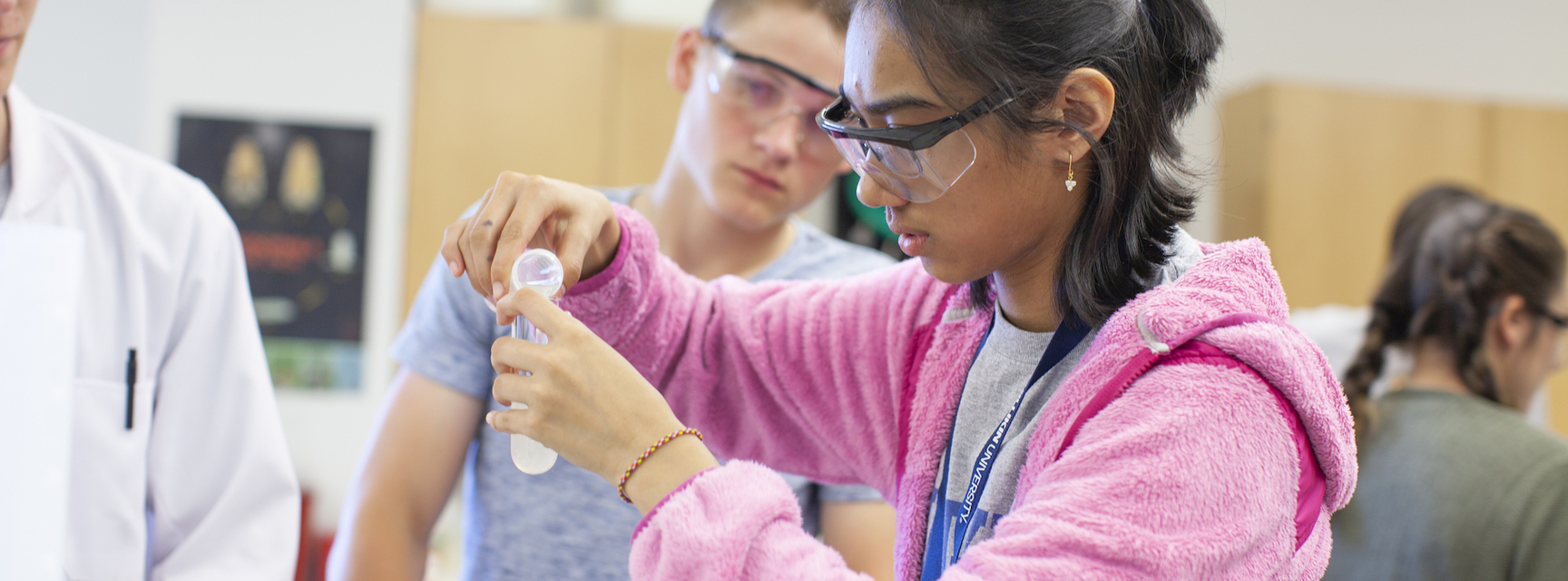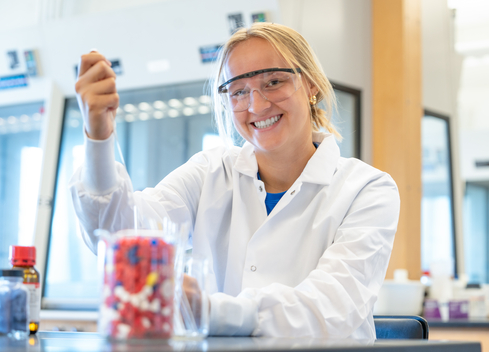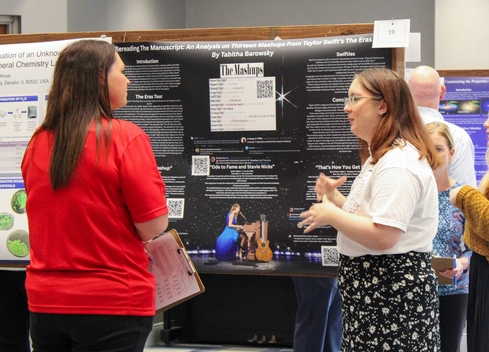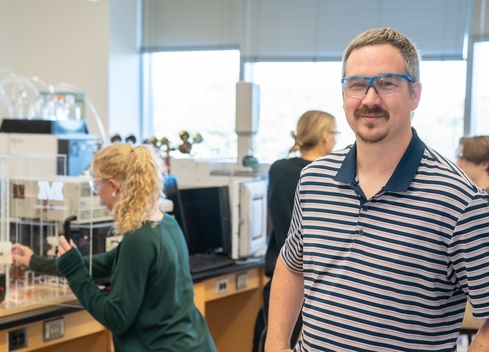Topics in Chemistry A topical approach to modern chemistry for non-majors. Basic concepts of chemistry will be covered with an emphasis on the importance, relevancy, and applications of chemistry in modern society. Topics may vary. (CH101) Elemental Geosystems This course provides an introduction to the earth from a systems perspective. The atmosphere, lithosphere, hydrosphere, and biosphere and their relation to human life are topics of study. Pre-requisite: none. (CH106) Accelerated General Chemistry Designed for students majoring in the natural sciences, this lecture course covers the essential concepts of chemistry at an accelerated pace. Lectures used in this course cover a broad range of topics, including substances, aqueous solutions, chemical reactions, basic bonding theory, molecular structure, mass relations, equilibrium, electrochemistry, states of matter, and nuclear chemistry. Concurrent enrollment in CH 151 is required. Prerequisite: Two years of high school chemistry and grades of C or higher. (CH131) Essentials of Organic and Biochemistry A one-semester survey of organic and biochemistry, this course is the second course in a one-year survey of chemistry for nursing students, allied health majors and others requiring a brief introduction to the chemistry of living systems. Topics include a survey of organic functional groups and reactions most important in biochemistry followed by an outline of basic structural biochemistry and intermediary metabolism. This course does not count towards a chemistry major or minor and it does not satisfy the entrance requirements of medical, veterinary medical, or dental schools. Concurrent enrollment in Chemistry 205 required. Pre-requisite: Chemistry 121. (CH203) General Inorganic Chemistry This course is designed to be the first course for chemistry majors who received proficiency credit for CH121 and to be the principle follow-up of Chemistry 121 for students in the natural sciences. This course introduces the chemistry of metals and non-metals. Topics include: the chemistry of the nonmetallic elements, the chemistry of metals, atomic and molecular structure, solid state chemistry and industrial chemistry. Credit or concurrent enrollment in Chemistry 151 is required. Chemistry 152 is the companion laboratory course. Pre-requisite: Chemistry 121 or Chemistry 121 proficiency. (CH224) General Analytical Chemistry This course, along with Chemistry 420, make up the core of analytical chemistry for majors. This course deals with solving quantitative and qualitative problems in analysis using volumetric, gravimetric, titrimetric and redox methods. There is an emphasis on quantitative problem solving and evaluation of methods and results. Acid-base equilibria and electrochemistry are central topics. Spectrophotometry and chromatography are also introduced. The course is especially useful for students interested in careers involving laboratory work. Chemistry 253 is the companion laboratory course. Pre-requisite: Chemistry 224. (CH232) Organic Chemistry II The second course in a two-tiered sequence, this course is designed to reinforce, expand, and add theoretical depth to the content of Chemistry 301. Reaction mechanisms are emphasized. Applications of organic chemistry to living systems are extensive; structural biochemistry of carbohydrates, steroids, and polymers is introduced. Any laboratory course in the 250 series may be taken as a corequisite laboratory. Pre-requisite: Chemistry 301. (CH302) Physical Chemistry I The first course in physical chemistry for chemistry majors. Topics include the laws of thermodynamics, elementary statistical thermodynamics, equilibrium, surface chemistry and physical chemistry of macro- molecules. Chemistry 351 and 353 are companion laboratory courses. Pre-requisite: Mathematics 240 and 1 year of Physics. (CH303) Physical Chemistry II Continuation of Chemistry 303, this course emphasizes applying quantum mechanics to understand chemical bonding and spectroscopy. Chemical kinetics also is covered. Cross-listed with Physics 304. Chemistry 351 and 353 are companion laboratory courses. Pre-requisite: Chemistry 303. (CH304) Secondary Science Content and Lab Development This course is designed for students who are planning to be certified in Illinois to teach middle or high school science. The modules are intended to help the student to fill in gaps in content knowledge. Students will complete instructional modules in the following topics: astronomy, earth science, instructional planning and assessment in science. national science education standards, and safety in the classroom. Cross-listed with BI 310. Pre-requisite: Acceptance for Student Teaching. Co-enroll in ED 425. Fall. (CH310) Pharmacology Designed to be an introduction to pharmacology with implications for nursing practice, this course is suitable not only for majors in nursing but majors in biology, allied health, psychology, athletic training, and other fields. Topics include absorption, distribution, metabolism and elimination of classes of drugs commonly used in medical practice. Emphasis is placed on principal therapeutic uses, important side effects and mechanisms of action. Pre-requisites: Chemistry 121, Biology 206, Biology 207, or at least six 300-level credits in Chemistry and/or Biology or consent of instructor. (CH314) Biochemistry Designed for all majors in the natural sciences, this course discusses the organic and physical chemistry of life. Discussion is centered on the relationship between the structure and function of all biomolecules. Intermediate metabolism is introduced in detail. Energetics, kinetics and mechanism as well as interrelationships among pathways play an important role in the coverage. Chemistry 354 is the companion laboratory course. Pre-requisite: 4 courses in Chemistry including CH302. (CH331) Advanced Inorganic Chemistry Continuation of Chemistry 224, this course completes a one-year sequence in inorganic chemistry for majors. Topics include a systematic study of structure, bonding, reactions and periodic relationships of inorganic compounds including organometallics and bioinorganic compounds. Pre-requisite or corequisite: Chemistry 304. (CH406) Cell Biology A lecture/laboratory course in the methods of cell biology and the structure and function of cellular components. Cross-listed with Biology 313. Pre-requisite: Chemistry 331. (CH413) Instrumental Analysis Continuation of Chemistry 222, this course completes a one-year sequence in analytical chemistry for majors. It is designed to give students in chemistry and related fields a working knowledge of common instrumental techniques in current use, including chromatography, spectroscopy and electroanalysis. Chemistry 352 is the companion laboratory course. Pre-requisite or corequisite: Chemistry 304. (CH420) Spectroscopy Advanced Instruments An elective for majors emphasizing spectral interpretation and identification of molecular structure using NMR, IR, MS and UV-visible methods. Principles and instrumentation used in analytical spectroscopy are discussed. The implementation, characteristics and applicability of specific spectrochemical techniques also are covered. Pre-requisite or corequisite: Chemistry 304 and 420, or consent of instructor. Alternate years. (CH422) Advanced Biochemistry A seminar-style course in reading and understanding the primary literature in biochemistry. Individual oral presentations will include topics that delve deeply into current issues in biochemistry. Students will be expected to demonstrate competence in using Internet based tools and information. Pre-requisite: Chemistry 331 or consent of instructor. (CH432) Advanced Topics in Chemistry Selected topics in chemistry covering fields of analytical, physical, inorganic, organic and biochemistry. Offered on demand. May be repeated for credit with a different topic. Pre-requisite: Junior standing and consent of instructor. (CH490) | 





